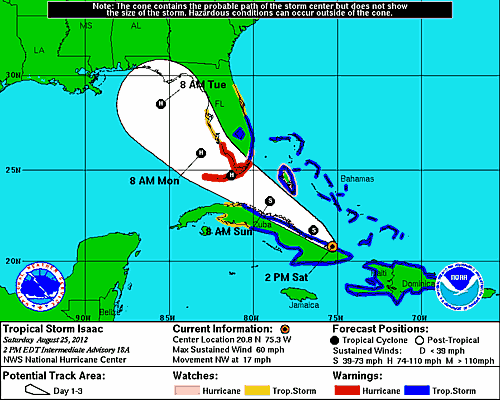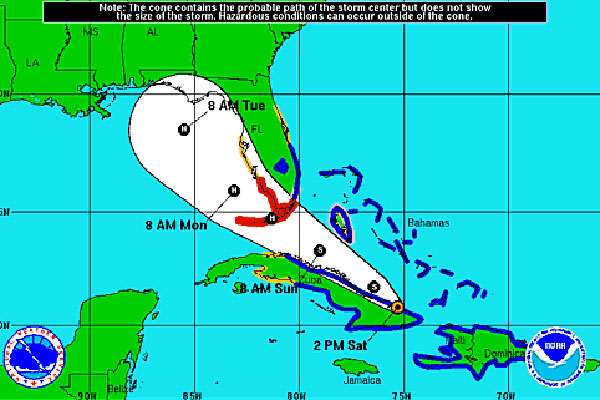
With Miami-Dade County under a tropical storm warning and hurricane watch, Monday classes have been cancelled. All non-essential operations – including the Wellness Center, Otto G. Richter and the law libraries, the UC, the Student Health Center and late-night dining – will close at 7 p.m. Saturday night. Clinical activities at the Miller School of Medicine will remain open.
The worst weather from tropical storm Isaac is expected to take place Sunday night and last until Monday morning.
The decision, based on the current weather forecast, came from the Crisis Decision Team, which meets when the University of Miami Office of Emergency Management believes there is a serious threat to the university. The team will meet again at 6 p.m. Saturday and issue another storm alert at 7 p.m.
“UM has been monitoring Isaac all week through our office of emergency management and the marine school,” said Patricia Whitely, vice president for student affairs.
Sunday morning, dining halls will open for breakfast from 7 a.m. to 10 a.m., and students living on-campus will be provided with a boxed lunch and dinner for the day.
The Coral Gables campus is not in a storm surge evacuation zone, and therefore would never be evacuated. Since 2002, the university has received $16 million in federal grants to retrofit 35 buildings across all three campuses. This allows the university to shelter students on campus.
“We are in very good shape to take care of the people who live on campus, short of living in a World War II bunker – we don’t have any of those,” said Luis Glaser, the special assistant to the president and former provost.
On-campus vendors provide food, generators and services for emergency repairs and debris clearance during and after a storm.
The university, however, does not open the campus or a shelter for off-campus students during a hurricane.
The procedures for housing, according to Jim Smart, director of housing and residential life, are storm-specific. At 45 mph of sustained winds, residential colleges will take a number of actions.
At this point, residential colleges may start to bring students into hallways and close doors.
According to Smart, “the biggest threat for us is not usually the storm itself.” Stagnant puddles of water and live wires can be particularly dangerous. Students are encouraged to stay inside.
In Stanford and Hecht Residential Colleges, students will be moved down to the first through sixth floors, because the buildings have outdoor stairwells and wind increases with altitude. However, the buildings were designed and built to withstand hurricanes and are sometimes considered the safest structures on campus.
Mahoney and Pearson Residential Colleges are concrete-enforced as well.
“They’re not going anywhere,” Smart said.
The University Village buildings, built in 2006, meet all hurricane code specifications. According to Smart, water intrusion from horizontal rain wind would be the biggest concern.
“We’ve been through enough of these things to know that you want to take them seriously,” Smart said.
The UM Hurricane Hotline will begin taking calls Sunday. For updated information, call 1-800-227-0354.
“Safety and security are our number one priorities, and staff will be available to help in any way possible,” Whitely said.
Plans are to resume normal operations on Tuesday.






